|
|
|
Sort Order |
|
|
|
Items / Page
|
|
|
|
|
|
|
| Srl | Item |
| 1 |
ID:
136291
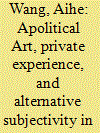

|
|
|
|
|
| Summary/Abstract |
For a revolution over “culture,” remarkably little has been said about the Cultural Revolution culture itself, and even less about the apolitical, private art produced underground. This article explores this apolitical, private art, arguing that it was a “rebellion of the heart” against the state’s ruthless destruction of the private sphere. Mao’s Party-state drastically fragmented families, moulding socialist subjects through “revolution deep down into the soul.” Paintings of (broken) homes and interiors, flowers, and moonlight articulate lived experiences of the revolution while silently reinventing a private refuge for the body and soul to subsist beyond state control. Defying orthodox revolutionary mass culture, this apolitical art articulated private experience and created a private inner world for a new form of modern subjectivity, while generating community and human solidarity against relentless class struggle and alienation.
|
|
|
|
|
|
|
|
|
|
|
|
|
|
|
|
| 2 |
ID:
136288
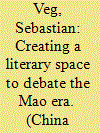

|
|
|
|
|
| Summary/Abstract |
Since the scar literature of the early 1980s, fiction and fictionalised autobiography have played an important role in bringing to light the mass violence of the Cultural Revolution. However, these texts remained within a well-defined framework in which the political system itself was not questioned. Over the last decade, by contrast, the Chinese literary field has focused more specifically on the 1950s, with works such as Yang Xianhui’s Chronicles of Jiabiangou (Tianjin, 2002), and Yang Jisheng’s Tombstone (Hong Kong, 2008). This paper focuses on Yan Lianke’s Four Books (Hong Kong, 2010), a full-fledged fictionalisation in a fantastic mode of the famine of the Great Leap Forward in a village on the Yellow River. Considering literature in the context of theories of the public sphere, it suggests that Yan’s book aims to broaden decisively the discussion on certain previously out-of-bounds aspects of the Mao era, an aim only partially thwarted by its failure to be published within mainland China. Four Books, like Yang Jisheng and Yang Xianhui’s works, thus represents an attempt to call into question the original legitimacy of the PRC polity and to create debate within the Chinese-speaking public sphere on the foundations of the current regime.
|
|
|
|
|
|
|
|
|
|
|
|
|
|
|
|
| 3 |
ID:
136293


|
|
|
|
|
| Summary/Abstract |
For a revolution over “culture,” remarkably little has been said about the Cultural Revolution culture itself, and even less about the apolitical, private art produced underground. This article explores this apolitical, private art, arguing that it was a “rebellion of the heart” against the state’s ruthless destruction of the private sphere. Mao’s Party-state drastically fragmented families, moulding socialist subjects through “revolution deep down into the soul.” Paintings of (broken) homes and interiors, flowers, and moonlight articulate lived experiences of the revolution while silently reinventing a private refuge for the body and soul to subsist beyond state control. Defying orthodox revolutionary mass culture, this apolitical art articulated private experience and created a private inner world for a new form of modern subjectivity, while generating community and human solidarity against relentless class struggle and alienation.
|
|
|
|
|
|
|
|
|
|
|
|
|
|
|
|
| 4 |
ID:
136292
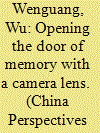

|
|
|
|
|
| Summary/Abstract |
For a revolution over “culture,” remarkably little has been said about the Cultural Revolution culture itself, and even less about the apolitical, private art produced underground. This article explores this apolitical, private art, arguing that it was a “rebellion of the heart” against the state’s ruthless destruction of the private sphere. Mao’s Party-state drastically fragmented families, moulding socialist subjects through “revolution deep down into the soul.” Paintings of (broken) homes and interiors, flowers, and moonlight articulate lived experiences of the revolution while silently reinventing a private refuge for the body and soul to subsist beyond state control. Defying orthodox revolutionary mass culture, this apolitical art articulated private experience and created a private inner world for a new form of modern subjectivity, while generating community and human solidarity against relentless class struggle and alienation.
|
|
|
|
|
|
|
|
|
|
|
|
|
|
|
|
| 5 |
ID:
136290
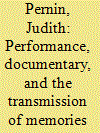

|
|
|
|
|
| Summary/Abstract |
Independent documentary film projects dealing with history have recently multiplied in China. While all seek to shed new light on personal experiences of the Mao era, they vary greatly in form, method, and scale. Launched in 2010 by Wu Wenguang at the Caochangdi Workstation, a space devoted to contemporary dance and documentary film, the Folk Memory Project aims at producing various textual and visual records of the historical experience of rural populations, especially during the Great Leap famine. Of special interest are the 20 documentaries of the Folk Memory Project’s film section – a body of works constantly growing following yearly returns by filmmakers to their “home” villages. These films are characterised by a performative aspect that is rare in other Chinese documentaries on similar topics. This contribution examines this body of documentaries and the role of performance and performativity in the recording of collective memory of the famine.
|
|
|
|
|
|
|
|
|
|
|
|
|
|
|
|
| 6 |
ID:
136295
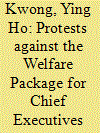

|
|
|
|
|
| Summary/Abstract |
In recent years, a series of social protests such as the “Sunflower Student Movement”inTaiwan and the “Umbrella Movement”in Hong Kong have sparked concerns over the political atmosphere in the Greater China Region.Compared withTaiwan and Hong Kong,the people of Macao have long been considered politically apathetic,with a low level of political awareness and efficacy. When asked whether they would oppose the government if their interests had been seriously infringed, around 40% of respondents chose to remain silent, perhaps out of a desire for“social harmony,”whereas 92.1% had no experience of engagement in any social movement. (1) It therefore came as a surprise when 20,000 people took to the streets on 25 May 2014 to protest against a bill that would have given generous benefits packages to outgoing Chief Executives (CEs) and top officials. In what was regarded as the biggest march since the 1999 handover, this exceptional scenario reveals the existence of a civic culture among the youth of Macao.
|
|
|
|
|
|
|
|
|
|
|
|
|
|
|
|
| 7 |
ID:
136294
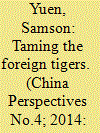

|
|
|
|
|
| Summary/Abstract |
Thirty years after the launch of the “reform and opening up” policy, China finally implemented its first anti-trust law in 2008, a move lauded by an international law firm as a “tremendous leap forward” that brought the country “squarely into the modern world of antitrust and competition law.”(1)Yet, given the law’s novelty on Chinese soil, few would have expected China to suddenly begin aggressively enforcing it. Since 2013, Chinese anti-trust regulators have become active in deploying the anti-trust law to initiate probes and impose hefty fines on industry associations, foreign carmakers, eyewear makers, and baby formula manufacturers, meanwhile justifying “dawn raids” on selected firms. Many of their high-profile targets are multinational firms that until then enjoyed a comfortable presence in China. Facing tightened enforcement, foreign companies and chambers of commerce are complaining that regulators are using the law selectively against foreign firms and that investigations lack transparency and respect for the rule of law.Chinese regulators, on the other hand, argue that they are impartial towards domestic and foreign companies, and that they are merely enforcing the anti-trust law in order to create a level playing field for both domestic and foreign companies, benefit Chinese consumers, and bring China closer to the rule of law.
|
|
|
|
|
|
|
|
|
|
|
|
|
|
|
|
|
|
|
|
|